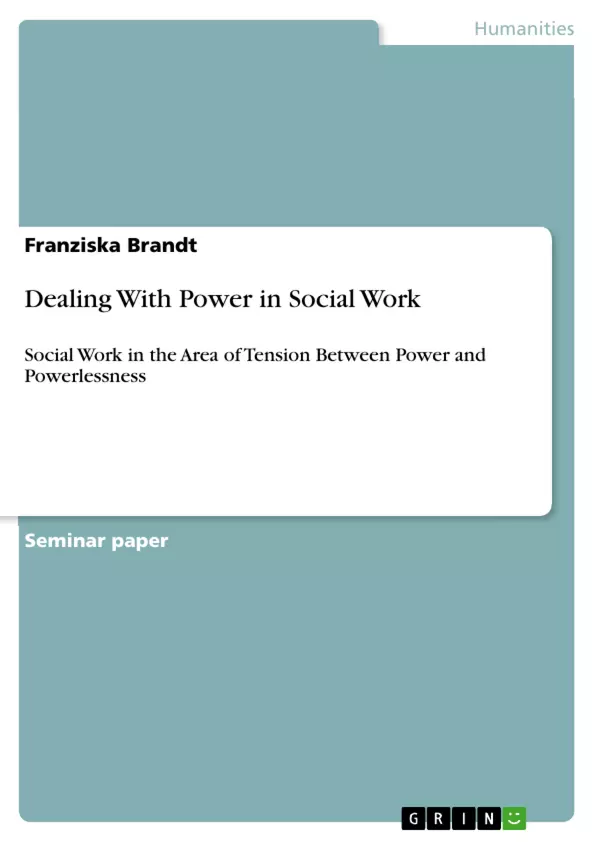When I started working on the topic of power and powerlessness in social work, I did not have many questions. It seemed self-evident that a social worker would be aware of his or her professional power and know how to use it wisely in terms of purposeful work with clients. In a closer examination of the literature, however, power in the context of social work turned out to be a controversial, even problematic topic: There is a lot of talk about power in general - but more silence about power in social work. Therefore, it was necessary to investigate this issue.
In dealing with power, we must also consider its counterpart, powerlessness. Powerlessness always means the absence of one's own power. The fact that members of the helping professions, but first and foremost clients, can feel powerless, helpless, is a recognized and accepted feeling.
The task here must be to find ways out of one's own powerlessness so as not to be at its mercy, to learn to accept it as one's own limits, and to show the client ways to overcome his powerlessness.
Power is rarely discussed; it is pushed away. Power in the social work field is often seen as something negative. "Thus, 'power' is immediately equated with 'abuse of power', with a condition that must be overcome as quickly as possible" (Stiels - Glenn 1996, p. 16). Power is denied.
Assuming the existence of power in social work, and indeed its justification, this thesis will deal primarily with asking why. After defining and explaining the terms, the second chapter deals with possible causes, reasons, their consequences and the problem of the abuse of power.
Powerlessness as the counterpart of power and as a feeling that can be professionally countered by social workers, be it their own powerlessness or that of the client, is addressed in chapter 3.
Concluding theses on possibilities and limits for a responsible use of professional power conclude my remarks in the last chapter.
Table of Contents
- Introduction
- Power and social work – (not) a contradiction
- Definition of power and conceptual explanations
- Power in social work
- Dealing with power
- Power in the self-image of the social worker
- Power and responsibility
- Abuse of power in social work
- Powerlessness in social work
- The powerlessness of helping
- Facing powerlessness
- Concluding theses for a responsible use of power in social work
- Conclusion
Objectives and Key Themes
This thesis examines the complex relationship between power and social work. The author investigates how power dynamics manifest in the helping profession, considering both the power held by social workers and the powerlessness experienced by clients. The main goal is to analyze the potential for a responsible use of power in social work and to highlight the importance of addressing power imbalances within the helping relationship.
- The concept of power in social work and its theoretical frameworks.
- The potential for abuse of power within the social work profession.
- The experience of powerlessness in both clients and social workers.
- Strategies for responsible and ethical use of power in social work.
- The challenges and possibilities of achieving a more balanced power dynamic in the helping relationship.
Chapter Summaries
- Introduction: This chapter introduces the topic of power and powerlessness in social work, highlighting the controversial nature of the subject and the need for further investigation.
- Power and social work – (not) a contradiction: This chapter defines power and examines its various forms, including the power of social workers and the power of clients. It explores the potential contradictions between power and the helping profession.
- Powerlessness in social work: This chapter delves into the experience of powerlessness in both clients and social workers, exploring the factors that contribute to feelings of helplessness and the potential consequences for the helping relationship.
Keywords
The main keywords and focus topics of this text include power dynamics, social work ethics, professional responsibility, power imbalances, powerlessness, abuse of power, helping relationship, and client empowerment.
- Quote paper
- Franziska Brandt (Author), 2005, Dealing With Power in Social Work, Munich, GRIN Verlag, https://www.grin.com/document/1190427



